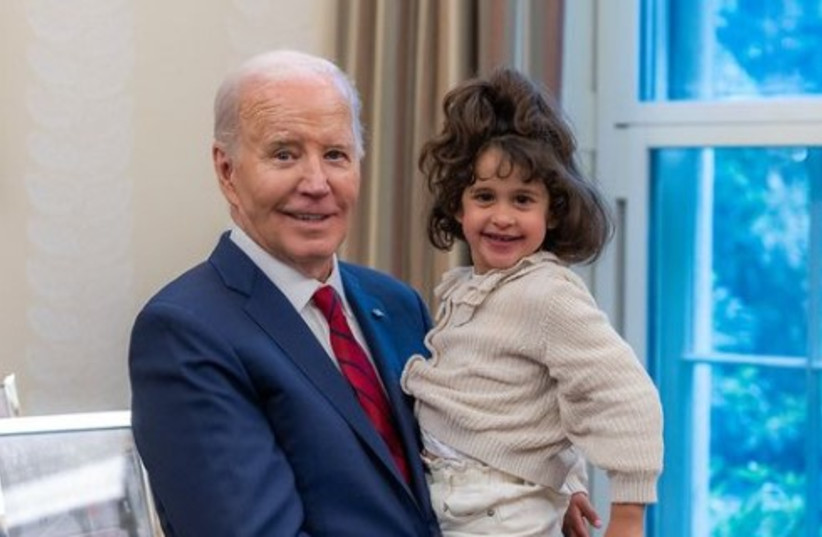It’s a tale of two Joe Bidens that has some Jews and Israel supporters scratching their heads, marveling at apparent inconsistencies.
There is the tale of Biden marking Holocaust Remembrance Day on Tuesday in the White House, exuding empathy toward Jews and Israel in a speech decrying swirling antisemitism on campuses and elsewhere.
“No one should have to hide or be brave just to be themselves,” he said in one poignant sentence, after earlier in the speech referencing Jews forced to “hide their kippahs under baseball hats, tuck their Jewish stars into their shirts.”
The president’s empathy was not reserved only for the Jews but also for the Jewish state, which he said saw the “ancient hatred of Jews” reenacted with horrific savagery on October 7.
“Now, here we are, not 75 years later [after the Holocaust] but just seven and a half months later [after October 7], and people are already forgetting. They’re already forgetting that Hamas unleashed this terror, that it was Hamas that brutalized Israelis, that it was Hamas who took and continues to hold hostages. I have not forgotten, nor have you, and we will not forget.”

That is one tale of Biden, the tale of a US president with a deep sympathy for the State of Israel born of what he heard of the Holocaust around his father’s table in Scranton, Pennsylvania, and strong friendships with Jews he established over the years such as late congressman Tom Lantos, a Holocaust survivor.
Yet on the same day that Biden delivered this heartfelt speech, The Wall Street Journal reported that for the first time since the Gaza war began, the US is delaying sending precision weapons to Israel. The Washington Post quoted a US official saying this should be seen as a shot across Prime Minister Benjamin Netanyahu’s bow to underscore the seriousness of US concerns about a Rafah invasion.
That, too, is a tale of Biden.
How to reconcile the two? The first Biden, strongly supportive of Israel and fully aware that Hamas is responsible for the current war, with the second Biden, the one delaying weapons to Israel, a move that – if extended – could curtail efforts to defeat Hamas and harm Israel if a wider war erupts in Lebanon.
Biden said that he had not forgotten Hamas’s atrocities. But that is not the only thing he has not forgotten. He has also not forgotten, in his telling and the telling of his spokespersons, the civilian fatality rate in this war. And he has also not forgotten that his administration is coming under intense pressure from protestors on college campuses and the progressive wing of his party to pressure Israel to stop the war and to distance itself from the Jewish State.
In short, Biden is walking a tightrope, balancing his instinctive support for Israel and the Jews with genuine concerns about civilian casualties and the fear of how those casualties will impact his reelection chances, which right now can be categorized as “iffy.”

One of the basic political assumptions in the US in recent months – an assumption that has gained ground during the highly publicized anti-Israel protests on dozens of campuses around the country – is that Biden’s policies on Israel will alienate Arab voters and Alexandria Ocasio-Cortez-style progressives, a demographic he will need to win in crucial swing states like Michigan.
But there is a flip side to that coin. If Biden is not seen as supportive enough of Israel, or if moderate Democrats get spooked by the protests, sometimes violent, filling their television screens night after night, that could push them out of the Democratic camp in November.
It’s not as if Biden only wins votes by turning on Israel, and everything else stays static. Being seen as too tough on Israel could cost him dearly among Jewish and pro-Israel supporters in a close election, and there are states out there beyond Michigan, with its large bloc of Arab voters, that he needs to win – swing states – in which the shift of a few percentages among Jewish or pro-Israel Democrats could make a huge difference.
Biden behind his competitor in the polls
For instance, polls show that Biden is significantly behind Trump in the battleground states of Arizona, Pennsylvania, and Georgia, which all have substantial Jewish populations.
But there is more to the story than that. While the media’s focus on the Gaza war makes it seem as though this is the main issue driving the conversation in the US and will be the central issue of importance for American voters in November, that is far from the truth.
In American elections, foreign policy issues are traditionally way down the list of the problems that the electorate prioritizes, with the top issues generally being issues such as the economy, abortion, immigration, and gun control.
Even among the country’s youth, the “conflict in the Middle East” is a low-priority issue, something that runs counter to the impression one might walk away with having watched campuses all over the country explode over the issue. Axios reported this week on a Generation Lab poll of 1,250 US college students that found that only 13% of them ranked the Middle East as their most important issue, ninth on a list of nine that was topped by healthcare reform, educational funding and access, and economic fairness and opportunity.
Even among the country’s youth, the “conflict in the Middle East” is a low-priority issue, something that runs counter to the impression one might walk away with having watched campuses all over the country explode over the issue. Axios reported this week on a Generation Lab poll of 1,250 US college students that found that only 13% of them ranked the Middle East as their most important issue, ninth on a list of nine that was topped by healthcare reform, educational funding, and access, and economic fairness and opportunity.
Speaking of the college protests, it is worth noting that the last time the campuses were in such an upheaval was some 56 years ago when students protested, marched, and conducted sit-ins against the Vietnam War in colleges across the country. Like 2024, 1968 was an election year.
In that election, Richard Nixon, running on a law and order ticket that resonated loudly for many reasons – including because of the anti-war protests – defeated the Democratic candidate Hubert Humphrey. Four years later, Nixon defeated another Democratic candidate, George McGovern. One lesson from that period was that the “silent majority” – middle America – was turned off and frightened by the rebelliousness and lawlessness that they saw in the campus protests and in race riots that plagued that era.
Will history repeat itself, and Biden get hurt in the upcoming election because of scenes of chaos and lawlessness on some campuses?
Jonathan Chait wrote an article this week in New York Magazine headlined “Biden is Losing the Election in the Center, Not the Left.” According to Chait’s argument, the more significant threat to the president's reelection chances is moderate voters defecting from Biden rather than Arab American or youthful progressives.
The protests on campus, he argued, are “contributing to the sense of chaos and failure that is harming Biden and helping Trump.”
The reason the Trump-Biden race is close, and Biden is trailing in the polls, is not because he is hemorrhaging far-left voters, but rather moderate ones who, among other problems, they have with Biden’s domestic agenda, are frightened by the chaos and anarchy the protests represent. “The people he needs to win back are not occupying college campuses,” Chait wrote.
This helps to explain the tale of two Bidens: a president who has to appeal to all sides. He needs to retain Jewish and pro-Israel voters, as well as Arab voters and anti-Israeli progressives. He also has to ensure that the Democratic middle holds.
In the process, he often sends mixed signals and contradictory messages: threatening to reassess policy toward Gaza if Israel does not alter its course in the war on the one hand, helping Israel shoot down hundreds of Iranian missiles and drones on the other; holding up arms sales to Israel on one day and passionately expressing support for Israel and Jews the next.
